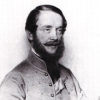Lajos Kossuth

Lajos Kossuth
Lajos Kossuth de Udvard et Kossuthfalvawas a Hungarian lawyer, journalist, politician and Governor-President of the Kingdom of Hungary during the revolution of 1848–49. With the help of his talent in oratory in political debates and public speeches, Kossuth emerged from a poor gentry family into regent-president of Kingdom of Hungary. As the most influential contemporary American journalist Horace Greeley said of Kossuth: “Among the orators, patriots, statesmen, exiles, he has, living or dead, no superior.” Kossuth's powerful English and American...
NationalityHungarian
ProfessionLawyer
Date of Birth19 September 1802
Men like me, who merely wish to establish political freedom, will in such circumstances lose all their influence, and others will get influence who may become dangerous to all established interests whatsoever.
I am a straightforward man.
I will not become a Napoleon nor an Alexander, and labour for my own ambition; but I will labour for freedom and for the moral well-being of man.
Judgment of the people is often wiser than the wisest men.
And if you cannot remain indifferent, you must resolve to throw your weight into that balance in which the fate and condition of man is weighed.
Humility is the part of wisdom, and is most becoming in men. But let no one discourage self-reliance; it is, of all the rest, the greatest quality of true manliness.
The tongue of man is powerful enough to render the ideas which the human intellect conceives; but in the realm of true and deep sentiments it is but a weak interpreter. These are inexpressible, like the endless glory of the Omnipotent.
Nationality is the aggregated individuality of the greatest men of the nation.
I am a man of peace, God knows how I love peace; but I hope I shall never be such a coward as to mistake oppression for peace.
I am a republican. I have avowed it openly in monarchical but free England; and am happy to state that I have lost nothing by this avowal there.
But the Hungarian nation, although taken by surprise, unarmed and unprepared, did not abandon its future prospects in any agony of despair.
I must therefore implore your indulgence for a pretty long and plain development of my views concerning that cause which the citizens of New York, and you particularly, gentlemen, honour with generous interest.
I came not to your glorious shores to enjoy a happy rest - I came not to gather triumphs of personal distinction, but as a humble petitioner, in my country's name, as its freely chosen constitutional leader, to entreat your generous aid.
I consider no man honest who does not observe towards other nations the principles which he desires to be observed towards his own: and therefore I will not interfere in your domestic questions.